
npj Breast Cancer
Scope & Guideline
Leading the charge in interdisciplinary cancer discovery.
Introduction
Aims and Scopes
- Clinical Outcomes and Treatment Strategies:
The journal emphasizes research that explores clinical outcomes associated with various treatment modalities, including chemotherapy, immunotherapy, and targeted therapies, aiming to improve patient management and treatment protocols. - Molecular and Genetic Insights:
Research focusing on the molecular mechanisms underlying breast cancer, including genetic mutations and their implications for personalized medicine, is a core area of interest, contributing to the understanding of tumor biology and treatment resistance. - Biomarkers and Predictive Models:
The development and validation of biomarkers for prognosis, treatment response, and recurrence prediction are significant themes, facilitating the implementation of precision medicine in breast cancer care. - Immunology and the Tumor Microenvironment:
Studies examining the immune landscape of breast cancer and the interactions between tumors and the immune system are critical, as they inform therapeutic strategies, particularly in immunotherapy. - Innovative Research Methodologies:
The journal promotes the use of advanced methodologies, including artificial intelligence and machine learning, to enhance diagnostic accuracy and treatment efficacy in breast cancer.
Trending and Emerging
- Immunotherapy and Immune Profiling:
There is a growing trend towards research on immunotherapeutic approaches and the characterization of immune responses within tumors, highlighting the importance of the immune microenvironment in treatment efficacy. - Liquid Biopsy and Circulating Biomarkers:
The use of liquid biopsy techniques to monitor disease progression and treatment response is gaining traction, as these non-invasive methods offer real-time insights into tumor dynamics and potential therapeutic targets. - Artificial Intelligence in Cancer Research:
The integration of artificial intelligence and machine learning in analyzing complex datasets, including imaging and genomic data, is increasingly prevalent, showcasing innovative approaches to improve diagnostic accuracy and treatment personalization. - Health Disparities and Patient-Centered Research:
Research focused on health disparities, access to care, and patient-reported outcomes is on the rise, reflecting a broader movement towards understanding the social determinants of health and improving equity in breast cancer treatment. - Microbiome and Tumor Interactions:
Emerging studies on the role of the microbiome in breast cancer progression and treatment response are gaining attention, suggesting that microbial communities may influence tumor behavior and patient outcomes.
Declining or Waning
- Traditional Chemotherapy Approaches:
Research focusing solely on traditional chemotherapy regimens is becoming less frequent, as the field shifts towards more personalized and targeted therapies that consider the unique genetic and molecular profiles of tumors. - Basic Histopathological Studies:
While still relevant, the volume of studies dedicated to basic histopathological analyses without integrating advanced molecular or genetic insights appears to be declining, as the field increasingly emphasizes comprehensive multi-omics approaches. - Single-Agent Targeted Therapies:
The focus on single-agent therapies is waning in favor of combination therapies that aim to enhance efficacy and overcome resistance mechanisms in breast cancer treatment.
Similar Journals
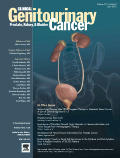
Clinical Genitourinary Cancer
Advancing knowledge in genitourinary oncology.Clinical Genitourinary Cancer, published by CIG MEDIA GROUP, LP, is a leading journal in the fields of Oncology and Urology, with an impressive impact reflected in its quartile rankings (Q2 in Oncology and Q1 in Urology for 2023) and strong Scopus rankings (22nd in Urology and 162nd in Oncology). The journal aims to innovate and inspire new research in genitourinary malignancies, providing a platform for the latest findings in diagnosis, treatment, and patient management. With its commitment to high-quality publications since its establishment in 2005, Clinical Genitourinary Cancer serves a crucial role in advancing the understanding of these complex conditions and enhancing clinical practices. Researchers, professionals, and students in the medical community are encouraged to engage with this essential resource, which facilitates open access to pioneering studies that drive the field forward.

EXPERT REVIEWS IN MOLECULAR MEDICINE
Connecting Experts to Shape the Future of MedicineEXPERT REVIEWS IN MOLECULAR MEDICINE, published by Cambridge University Press, stands at the forefront of research in the fields of Molecular Biology and Molecular Medicine. With an impressive impact factor reflecting its Q1 status in both relevant categories, this journal serves as an essential platform for disseminating cutting-edge reviews and critical assessments that are vital for advancing our understanding of molecular mechanisms in health and disease. Established in 1997 and continuously evolving until 2024, it features contributions from leading experts that highlight emerging trends and innovative methodologies. Researchers, professionals, and students are encouraged to engage with the content, benefiting from the journal’s rigorous peer-review process and its commitment to academic excellence, making it a valuable resource within the scientific community.

CANCER IMMUNOLOGY IMMUNOTHERAPY
Transforming Insights into Effective Cancer TreatmentsCancer Immunology Immunotherapy, published by Springer, stands as a premier journal in the fields of cancer research and immunology, holding a prestigious Q1 ranking across multiple categories, including Oncology and Medicine as of 2023. With an ISSN of 0340-7004 and an E-ISSN of 1432-0851, this journal has been a pivotal platform for groundbreaking research since its inception in 1976, continuing to provide insight into the complex interactions between the immune system and cancer. The journal's scope encompasses a wide array of topics, including novel therapeutic strategies, immunological mechanisms, and translational science aimed at advancing treatment outcomes for cancer patients. Renowned for its rigorous peer-review process and high impact factor, it attracts contributions from leading experts and researchers around the globe, positioning itself among the top-tier publications with Scopus rankings that reflect its vital role in advancing the field. Access options are generally subscription-based, ensuring a comprehensive resource for professionals and academics seeking to deepen their understanding and make meaningful contributions to cancer immunotherapy.
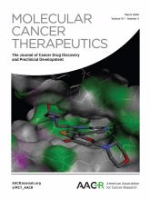
MOLECULAR CANCER THERAPEUTICS
Innovating the future of oncology, one study at a time.MOLECULAR CANCER THERAPEUTICS, published by the American Association for Cancer Research, is a premier journal dedicated to advancing the field of cancer research and therapy since 2001. With a notable impact factor reflecting its high-quality content, this journal stands out in the Q1 category for both Cancer Research and Oncology as of 2023. Researchers, clinicians, and students interested in innovative treatment strategies and molecular mechanisms can find valuable insights within its pages, bolstered by a rigorous peer-review process and a global perspective on cancer therapeutic developments. Although the journal operates under a subscription model, it provides comprehensive access to cutting-edge studies and reviews that drive forward the understanding of cancer biology and treatment modalities. The journal's impressive Scopus rankings further validate its influence within both oncology and the broader cancer research community, making it an indispensable resource for anyone committed to combating cancer through science.
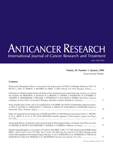
ANTICANCER RESEARCH
Shaping Tomorrow’s Cancer Therapies TodayANTICANCER RESEARCH, published by the International Institute of Anticancer Research, stands at the forefront of cancer-related scholarly communication. With ISSN 0250-7005 and E-ISSN 1791-7530, this esteemed journal has been serving the global research community since 1981, showcasing innovative research aimed at combating cancer through various therapeutic approaches and scientific inquiry. Based in Greece, the journal aims to disseminate vital findings in the fields of Cancer Research, Medicine, and Oncology, reflecting its notable categorization in the Q3 and Q2 quartiles as of 2023. Despite its rigorous peer-review process and the absence of open access, ANTICANCER RESEARCH remains a vital publication for researchers, clinicians, and students eager to stay updated on the evolving landscape of anticancer strategies. As it converges to its milestone year of 2024, the journal continues to enrich the discourse around cancer treatment and prevention, affirming its position as an essential resource for those dedicated to advancing knowledge in anticancer therapies.
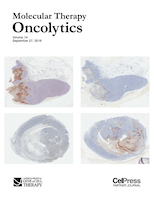
Molecular Therapy Oncolytics
Advancing Oncological Science for Global ImpactMolecular Therapy Oncolytics is an esteemed Open Access journal published by CELL PRESS, focusing on cutting-edge research in the fields of oncology, molecular medicine, and pharmacology. Established in 2014, the journal has quickly gained a prominent position in the academic community, reflected in its impressive Q1 and Q2 rankings across various categories including Cancer Research, Molecular Medicine, and Pharmacology. With an impactful presence in the UK and a strong international readership, it aims to disseminate significant advancements in therapeutic strategies targeted at cancer treatment and management. By providing a platform for peer-reviewed research, Molecular Therapy Oncolytics plays a critical role in bridging the gap between scientific innovation and clinical application, making it an invaluable resource for researchers, healthcare professionals, and students striving to contribute to the evolving landscape of oncology.
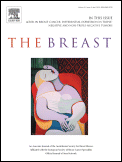
BREAST
Shaping the future of oncology with peer-reviewed excellence.BREAST is a leading peer-reviewed journal dedicated to advancing knowledge and practice in the fields of cancer research, oncology, and surgery, published by Churchill Livingstone. With an impressive impact factor and a prestigious Q1 ranking in multiple categories including Cancer Research, Medicine, and Surgery, the journal consistently delivers high-quality content that informs and inspires researchers, clinicians, and educators. Since its transition to Open Access in 2020, BREAST has significantly expanded its reach, providing immediate and unrestricted access to pivotal studies and findings in breast health and disease management. With a history dating back to 1992 and converging to 2024, the journal serves as an essential resource for the latest developments and innovative approaches in the clinical and biomedical aspects of breast care. Scholars and professionals alike can explore a wealth of research aimed at improving patient outcomes and fostering scientific dialogue in this vital area of healthcare.

Cancer Communications
Empowering the Fight Against Cancer Through Open AccessCancer Communications, published by WILEY, is a leading open-access journal that has positioned itself at the forefront of cancer research and oncology since its inception in 2017. With an impressive HIndex reflective of its scholarly impact and recognized in the Q1 category for both Cancer Research and Oncology as of 2023, this journal consistently ranks in the top echelons of its field, specifically at Rank #16/404 and Rank #13/230 in their respective categories on Scopus. Cancer Communications aims to disseminate cutting-edge research findings, innovative methodologies, and significant advancements in cancer treatments, thereby fostering a deeper understanding of oncology among researchers, healthcare professionals, and students. The journal operates under an Open Access model since 2018, ensuring that vital research is accessible to a global audience, thus enhancing collaboration and knowledge sharing necessary to tackle one of the most pressing health challenges of our time. Located in Hoboken, NJ, United States, and with a strong commitment to scientific excellence, Cancer Communications remains an essential resource for anyone engaged in the fight against cancer.

Translational Oncology
Advancing Cancer Research from Lab to LifeTranslational Oncology is a premier open access journal published by Elsevier Science Inc, dedicated to the rapidly evolving field of cancer research and oncology. Since its inception in 2008, the journal has been a vital platform for the dissemination of innovative research and findings that bridge the gap between laboratory discoveries and clinical applications. With an impressive impact factor and ranked Q2 in Cancer Research and Q1 in Oncology, it occupies a prominent position in the academic landscape, helping to shape the future of cancer therapeutics and patient care. The journal offers valuable insights across a diverse array of topics, including molecular biology, genetic factors in cancer, and innovative treatment strategies, ensuring relevance and engagement for its readership. As it converges toward 2024, Translational Oncology continues to attract a global audience of researchers, healthcare professionals, and students committed to advancing our understanding of cancer and enhancing clinical outcomes.

Nature Cancer
Transforming Insights into Impactful SolutionsNature Cancer, published by NATURE PORTFOLIO, stands at the forefront of oncological research with a robust impact within the scientific community. As an esteemed journal with impressive rankings—#12 in Medicine (Oncology) and #8 in Biochemistry, Genetics and Molecular Biology (Cancer Research) according to Scopus, placing it within the 97th and 96th percentiles respectively—Nature Cancer boasts a Q1 category status in both Cancer Research and Oncology for 2023. The journal's commitment to advancing cancer research is crucial, promoting high-quality, peer-reviewed studies that address the complexities of cancer biology and treatment. By facilitating open access to impactful findings, Nature Cancer aims to foster collaboration and inspire innovative approaches among researchers, professionals, and students alike, making significant strides in the global fight against cancer. As this pivotal publication continues its converged years from 2020 to 2024, it heralds a future ripe with transformative insights and breakthroughs in the vital field of oncology.